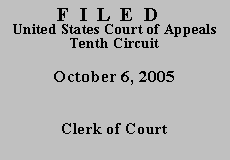

| UNITED STATES OF AMERICA, |
|
| v. | |
| SAUL JIMENEZ-JIMENEZ, also known as Alberto Jimenez, also known as Alberto Jimenez-Aguilar, |
Factual and Procedural Background
In 2002, Mr. Jimenez-Jimenez was convicted in the District Court, Pueblo County, Colorado, of the felony offense of unlawful possession with intent to distribute a schedule II controlled substance, an "aggravated felony" as defined in 8 U.S.C. § 1101(a)(43). On October 2, 2002, following the state court conviction, Mr. Jimenez-Jimenez was ordered deported from the United States by the then-Immigration and Naturalization Service. He was transported to Mexico on October 8, 2002. On June 9, 2004, officers of the Pueblo Police Department found Mr. Jimenez-Jimenez in Pueblo, Colorado. They arrested him for giving a false name and for having small quantities of suspected drugs in his possession. On June 23, 2004, Mr. Jimenez-Jimenez was charged with illegal re-entry after deportation and after committing an aggravated felony, to which he pled guilty on September 2, 2004.
At the sentencing hearing, the district court denied Mr. Jimenez-Jimenez's request for a downward departure based on the factors stated in 18 U.S.C. § 3553(b); the victim's conduct; and coercion or duress. The district court adopted the pre-sentence report and sentenced Mr. Jimenez-Jimenez at the bottom of the recommended Guidelines range, to 77 months in prison. Although Mr. Jimenez-Jimenez did not raise a Booker objection to his sentence, the district court nonetheless stated that "the court would impose the same sentence even if the guidelines were set aside and the court were to impose a discretionary sentence within the statutory maximum."
Mr. Jimenez-Jimenez appeals his sentence, claiming that the district court's mandatory application of the Sentencing Guidelines constituted reversible error pursuant to Booker.
Discussion
Mr. Jimenez-Jimenez concedes that he did not raise the Booker issue in the district court, and, therefore, we review his sentence for plain error. United States v. Gonzalez-Huerta, 403 F.3d 727, 732 (10th Cir. 2005) (en banc). "Plain error occurs when there is (1) error, (2) that is plain, which (3) affects substantial rights, and which (4) seriously affects the fairness, integrity, or public reputation of judicial proceedings." Id. (quotation omitted).
There are two types of Booker error: constitutional Booker error and non-constitutional Booker error. Id. at 731-32. Constitutional Booker error occurs when a sentencing court mandatorily increases a sentence on the basis of judge-found facts other than the fact of a prior conviction. Id. at 731. Non-constitutional Booker error, in contrast, occurs when a sentencing court applies the Guidelines in a mandatory, rather than discretionary fashion, even though the sentence was calculated solely upon facts admitted by the defendant, found by a jury, or based upon a prior conviction. Id. at 731-32.
Mr. Jimenez-Jimenez claims that the district court committed non-constitutional Booker error by imposing his 77-month sentence, which was at the bottom of the Guidelines range of 77 to 96 months, pursuant to the then-mandatory Guidelines. As the government concedes, this mandatory application of the Guidelines constitutes error that is plain. See id. at 732. However, to satisfy the third prong of plain error analysis--that the sentence affected Mr. Jimenez-Jimenez's substantial rights--Mr. Jimenez-Jimenez must show that the error was prejudicial. United States v. Trujillo-Terrazas, 405 F.3d 814, 819 (10th Cir. 2005). The burden to establish prejudice rests upon the party that failed to raise the issue below. Id. Thus, Mr. Jimenez-Jimenez must show a "'reasonable probability' that the defects in his sentencing altered the result of the proceedings." Id. (quoting United States v. Dominguez Benitez, 542 U.S. 74 (2004)).
Mr. Jimenez-Jimenez contends that he satisfies the third prong of the plain error test because non-constitutional Booker error constitutes structural error, requiring reversal without a showing of prejudice. After Mr. Jiminez-Jimenez submitted his brief, however, this Court, sitting en banc, held that non-constitutional Booker error is not structural error. Gonzalez-Huerta, 403 F.3d at 734. Therefore, Mr. Jimenez-Jimenez's structural error claim lacks merit. Mr. Jimenez-Jimenez properly concedes that he was not prejudiced by the district court's mandatory application of the Guidelines. The district court's Statement of Reasons for Sentence forecloses any possibility that Mr. Jimenez-Jimenez would have received a different sentence under a discretionary Guidelines regime. United States v. Serrano-Dominguez, 406 F.3d 1221, 1224 (10th Cir. 2005) (holding that non-constitutional Booker error does not affect substantial rights where the district court stated at sentencing that it would impose the same sentence without the Guidelines). Here, the district court explained that it "would impose the same sentence even if the guidelines were set aside and the court were to impose a discretionary sentence within the statutory maximum." ®. Vol. IV, p. 4.) Because nothing in the record suggests that Mr. Jimenez-Jimenez would receive a different sentence on remand, the district court's mandatory application of the Guidelines did not affect his substantial rights.
Finding that the sentence imposed by the district court did not constitute plain error, we dismiss Mr. Jimenez-Jimenez's appeal. The judgment of the
United States District Court for the District of Colorado is AFFIRMED.
Entered for the Court,
Michael W. McConnell
Circuit Judge
*.This order and judgment is not binding precedent, except under the doctrines of law of the case, res judicata, and collateral estoppel. The court generally disfavors the citation of orders and judgments; nevertheless, an order and judgment may be cited under the terms and conditions of 10th Cir. R. 36.3.